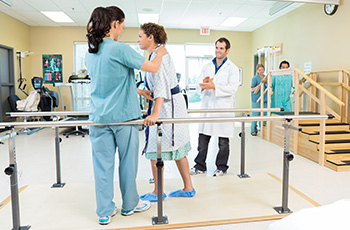
If you’re one of the 795,000 Americans who’ve suffered a stroke in the last year, what should you expect for the rest of your life? Although stroke remains a leading cause of long-term disability in the U.S., early and comprehensive therapy can make a profound difference on long-term health and quality of life.
Who could benefit from stroke rehabilitation?
The things most of us take for granted—walking, shopping, talking on the phone—can seem impossible after a stroke. The good news is, recognizing and taking charge of the struggles you’re facing (or someone you love is facing) can put you on the path toward improved recovery. Common signs that could signal a need for continued stroke rehabilitation include:
- Feeling unsteady or falling
- Weakness or fatigue
- Trouble dressing or bathing
- Memory and/or attention problems
- Problem-solving difficulties at work or home
- Decline in speed of thinking
- Trouble reading or writing
- Slurred speech
- Difficulty eating or swallowing
- Challenges with expressing yourself (“finding the right words”) or understanding others
- Driving impediments
- Impaired sexual function
- Bowel and/or bladder incontinence
What does stroke therapy involve?
Rehabilitation may include a variety of approaches, and will depend on how a person has been affected both physically and mentally by a stroke. Some common types of stroke therapies include:
- Physical therapy for improving motor skills, coordination and balance
- Occupational therapy for managing activities of daily living, such as dressing, bathing and cooking
- Speech therapy for regaining language, speech and cognitive skills
- Mobility support and training to help you use aids like canes, walkers and braces
- Constraint-induced therapy for strengthening weakened limbs
- Range-of-motion therapy to decrease muscle tension and enhance mobility
Why does stroke rehabilitation matter?
Stroke rehabilitation can help you realize more independence and get the most from life. While stroke complications and each patient’s ability to cope with these complications will vary, research has shown that focused rehabilitation enables survivors to perform better overall compared to those who don’t receive therapy.
How long will rehabilitation last?
Your recovery plan will be tailored based on the severity of your stroke, your health and personal needs, and your insurance coverage. Outpatient rehabilitation can last as long as you’re willing to dedicate yourself to working to-ward improvement. Recovering from a stroke can be long and frustrating, but perseverance and hard work will yield the greatest benefit.
Where can you learn more
Holland Hospital offers access to the full continuum of stroke care. For more than 25 years, Holland Hospital Rehabilitation Services has been guiding the health, wellness and recovery of patients who’ve experienced stroke, brain injury or other neurological conditions.